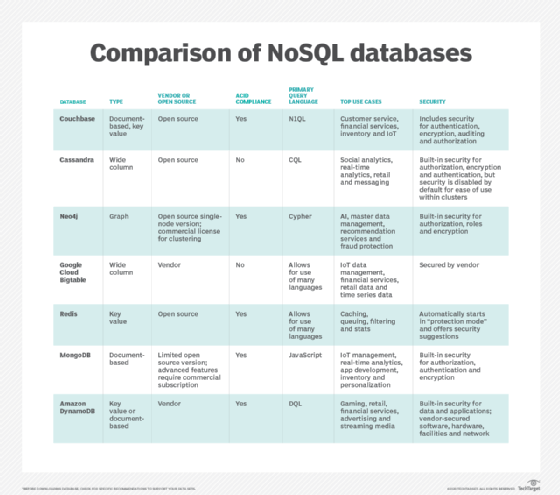NoSQL database comparison to help you choose the right store
With so many NoSQL databases to choose from, how can you tell which is best for your data set? Check out this comparison of some of the most popular NoSQL databases.

NoSQL databases have been on the rise for over a decade. Stemming from Google and social media, it's no surprise they support diverse and complex data sets in ways relational databases don't.
Finding the right NoSQL database remains a challenge because there are so many options with varying architectures and primary use cases. A NoSQL database comparison starts with many considerations.
What is NoSQL?
One of the more difficult parts about defining NoSQL databases is that they are more often defined by what they aren't. The main thing these databases is that the main query language is not -- only -- SQL. There are four main types of databases in the NoSQL distinction: key value, wide column, document-based and graph.
Key value. This database connects a unique key with an associated value. Values can range from simple notations to more complex JSON documents. Key-value stores are highly scalable, making them popular for click path data and streaming media.
Wide column. Wide column databases store data in large column-based tables instead of rows. Queries can be run quickly on large amounts of data, making these databases common for retail and IoT data.
Document-based. These databases store information that is semi-structured in a document format. This format makes updating and creating programs easy. Because of this, document-based stores are often used for financial services and content management data.
Graph. In graph databases, data is stored in nodes and stores the relationship between each node as additional data. This format allows easier exploration of relationships between data and is often used when relationships are especially important, such as fraud protection and customer recommendation services.
NoSQL on its way out?
For years, experts have touted that NoSQL is on its way out. Many have quoted the Gartner hype cycle, and to some degree, the NoSQL hype has petered out in many industries. But these databases have held strong for certain applications, though relational databases remain dominant in the market. Just last year, Forrester reported that half the global data and analytics tech decision-makers had already implemented or were planning to implement NoSQL.
While many organizations find their data needs satisfied by relational databases, NoSQL is still seen as standard for certain use cases, including IoT data management, streaming media, social media and real-time analytics, where a high quantity of data comes in fast and often unstructured. According to a recent study by ScaleGrid, a database-as-a-service provider, over 75% of multiple database users include both SQL and NoSQL to manage their data.
Multi-model and NoSQL
While there's a growing need for multi-model databases, it's still not common in the most popular NoSQL databases. However, it's is growing as the need for multiple models of data does.
Currently, many organizations will use multiple databases -- some even split their data between both relational and NoSQL databases -- for different data models in polyglot stacks, though this is not the most desirable format. Today, Amazon's DynamoDB, Couchbase and Redis offer multi-model abilities, and others are sure to follow.
Security
Security has long been seen as an issue for NoSQL databases. One of the benefits of most models is the ability for multiple analysts to have access to the available data. However, this is intrinsically counterintuitive to secure databases.
In recent years, NoSQL models have put more and stronger security measures in place, from automatic data encryption to user authentication and authorization methods. Additionally, to supplement the increase in security, many NoSQL databases include standard audit logs to alert enterprises early to inconsistencies in data or logs so enterprises can be more proactive in stopping data breaches.
NoSQL database comparison
If your organization's data seems like a good fit for a NoSQL database, there's still the issue of choosing the right database to support that data. With so many options available and so many different structures for NoSQL databases, deciding which one will work best for your organization is no easy task.
This NoSQL database comparison reviews the most popular choices. Though there are other databases in the market, these run the gamut for typical architectures, security and popular use cases.